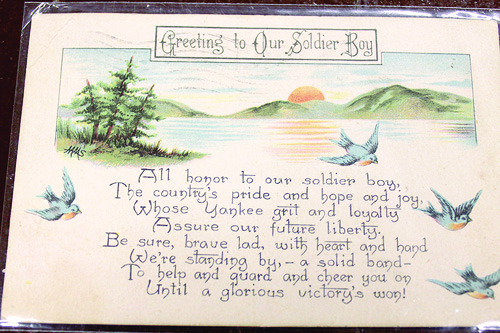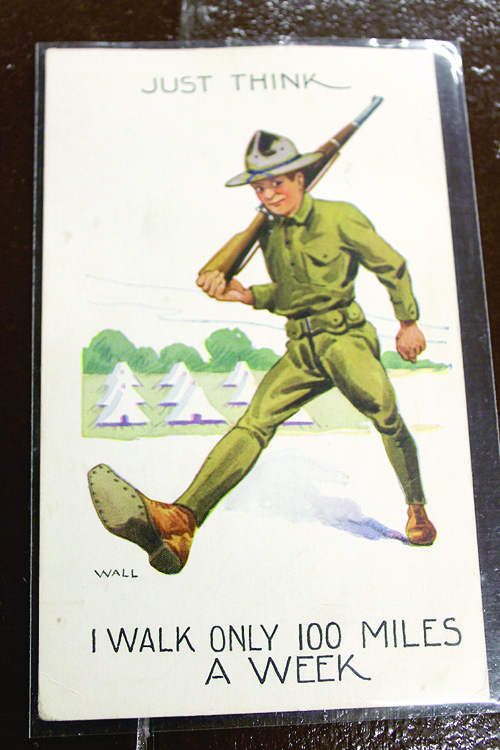Letters pen war history

By Dawn De Busk
Staff Writer
HARRISON — During World War I and also World War II, people used whatever paper or greeting cards they could find to write letters to their family members fighting overseas.
When Carolee Collier ran across a postcard in the Harrison Historical Society Museum, and she saw that it said, ‘To my sailor boy,’ she thought for certain it was from a sweetheart, but it was from the sailor’s brother.
This year, in preparation for Veterans Day, Collier thought it would be an interesting spin on military history, to tell the stories of the Harrison residents who have served through the war correspondence.
“Honoring our Veterans — there are so many ways. The exciting thing is that so many wrote down information that we could never know. We have been fortunate enough to have family members pass on the information that we can share and learn from diaries and letter,” Collier said.

Additionally, veterans who don’t have letters or diaries can record their memories for the museum to keep.
Local resident William “Bill” Carlson, who served during WWII, wrote a lot of letters that help put together his service story, she said.
He wrote to his family, describing some of his playful antics in boot camp, saying, ‘I get away with more stuff here than I ever did at Bridgton Academy.’
Then, when the war ended, Carlson had more time on his hands to put a pen in his hands and let his family know how he was doing and what was happening.
“There were month and months of letters going back and forth after Japan surrendered,” Collier said.
Carlson sent postcards to each of his sisters.
Also, during that time period, WWII, the United States government had a different way of sending mail. It was called V-Mail. Instead of thousands of individual letters, the soldier’s letters were put on a reel. One objective was to protect national interests, and censor any sensitive information that military personnel might be sharing with family back home. Folks who had family serving in WWII may recall receiving letters with information blackened out, she said.
Civil War, 1861 to 1865
On Sunday afternoon, the day after Veterans Day, Collier provided a slide presentation featuring wartime letter and postcards at the Harrison Historical Museum. She started with the Civil War.
“When I ‘Googled’ the Civil War, one of the things that they said about Maine is we had the highest percentage of people who joined up — of all the states during the civil war. Lot of patriotism,” Collier said.
She shared the life of James Lewis Green, who served in a 25th regiment of the Maine Infantry of Volunteers. (Green is the great grandfather of Phil Denison, another Harrison resident who is a Korean War vet.)
“In his [Green’s] diary . . . he talks a lot about food. Imagine that. They are out in an encampment, where they can’t get too far way. He is talking about for breakfast, he might have some beans, some steak, fresh beef, applesauce. Those are the things he talked about quite a bit,” Collier said.
“He also talked about ‘saulted horse’ and ‘saulted mule.’ Apparently, in most cases, it was not really salted horse. It was some form of salted meat that was so dry and so rancid that you were pretty much rather have anything but that. But, occasionally that is what they got,” she said.
“He got letters from home. When they sent him information about what was going on at home — what Aunt Sue was doing or if the crop was coming in — they would actually include blank paper so that he could write back,” she said.
“That was something that made me think about how you can’t just go to the stationary store and buy some,” she commented.
“Some of his duties were to fell trees to keep the Rebel Calvary at bay, guard duty and picket, another form of guard duty. He could hear the canons in the distance. He saw prisoners, wounded and sick men carried back from the lines,” she said.
Bourdon Scribner was another Mainer who fought in the Civil War.
“His family got the letter that no family wants to receive. He was killed in action. His brother got the letter announcing his death,” Collier said.
The letter was written by the captain of the regiment in which Scribner served.
“In that letter, it goes into detail about what a fine soldier he was. ‘He was one of the finest in service. He was brave. He took his duties seriously.’ All the things that a person would want to hear about their family member,” she said.
They were “unable to obtain his body or the contents of his pockets until the next day,” the captain’s letter said.
“His pockets had been emptied by the time they were able to get back to him,” Collier said.
World War I
Bert Davis, a seaman for the Navy during of WWI, signed up for service before he had graduated from high school in 1917.
“He volunteered prior to finishing Bridgton Academy so he graduated early and they gave him a big sendoff at the train station. All the classmates and the teachers came. He always remembered that as something that happened,”
A less treasured memory was passed in the stories he told to his family.
“He was stationed in the Portland-Rockland area. He was on the boat, and he was on night patrol all by himself, 17 years old. In the distance, he saw lights coming in the sky. He thought enemy was attacking. He did his duty and went below deck and woke up the captain,” Collier said. “The lights were actually a trolly coming over the hill. Boy, did he feel like a country bumpkin that night.”
Hobert True Denison was a medic in France during WWI.
“In this Christmas greeting from home, he sent letter to Cliff Denison, saying, ‘I’ve made the most I can from the letter that I receoved,’ ” Collier said.
She guessed that he spent time and effort trying to decipher his handwriting.
“So glad to be able to get home on leave and see my mother,” Denison wrote.
Korean War/Vietnam War
Phil Denison, served in the army during the Korean War, wrote home, asking family to write him.
“Drop a line sometime. I sure would like to hear the latest gossip,” Denison.
A few decades later, during the Vietnam war, Randall Prince Scribner, an ES in the Army, asked his family to send certain, favorite things for his twenty-first birthday.
“Will be 21 soon. I want Toll House cookies, homemade donuts, malted milk balls,” Scribner wrote, “But don’t send money because I’ll just spent it and it’ll go to waste.”


